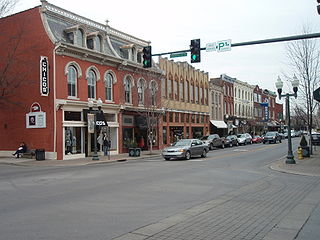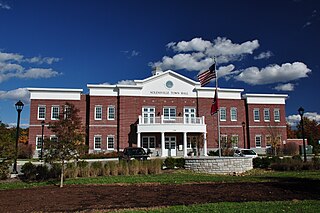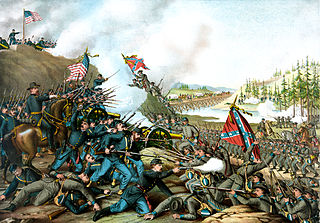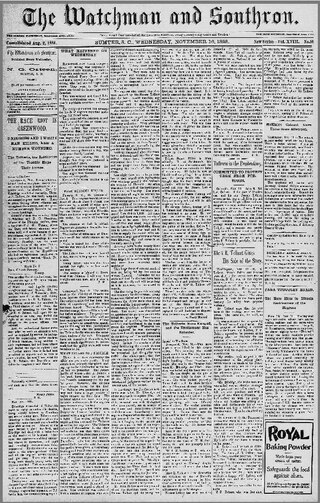Related Research Articles

Columbia is a city in and the county seat of Maury County, Tennessee. The population was 41,690 as of the 2020 United States census. Columbia is included in the Nashville metropolitan area.

Franklin is a city in and county seat of Williamson County, Tennessee, United States. About 21 miles (34 km) south of Nashville, it is one of the principal cities of the Nashville metropolitan area and Middle Tennessee. As of 2020, its population was 83,454. It is the 7th most populous city in Tennessee. Franklin is known to be the home of many celebrities, mostly country music stars.

Nolensville is a town in Williamson County, Tennessee. Its population was 13,829 at the 2020 census. It was established in 1797 by William Nolen, a veteran of the American Revolutionary War. Located in Middle Tennessee, it is about 22 miles southeast of Nashville. The town was reincorporated in 1996.

The Battle of Franklin was fought on November 30, 1864, in Franklin, Tennessee, as part of the Franklin–Nashville Campaign of the American Civil War. It was one of the worst disasters of the war for the Confederate States Army. Confederate Lieutenant General (LTG) John Bell Hood's Army of Tennessee conducted numerous frontal assaults against fortified positions occupied by the Union forces under Major General (MGEN) John Schofield and was unable to prevent Schofield from executing a planned, orderly withdrawal to Nashville.

Edward Ward Carmack was an attorney, newspaperman, and political figure who served as a U.S. Senator from Tennessee from 1901 to 1907.
The Pulaski riot was a race riot that occurred in Pulaski, Tennessee, on January 7, 1868. While the riot appeared to be based in a trade dispute of the previous summer between Calvin Lamberth, a white man, and Calvin Carter, an African American, it was provoked when Lamberth shot a friend of Carter's over rumored comments about the former's black mistress.

The People's Grocery lynchings of 1892 occurred on March 9, 1892, in Memphis, Tennessee, when black grocery owner Thomas Moss and two of his workers, Will Stewart and Calvin McDowell, were lynched by a white mob while in police custody. The lynchings occurred in the aftermath of a fight between whites and blacks and two subsequent shooting altercations in which two white police officers were wounded.

Henry Emerson Etheridge was an American politician and a member of the United States House of Representatives for Tennessee's 9th congressional district from 1853 to 1857, and again from 1859 to 1861. He also served one term in the Tennessee House of Representatives (1845–1847) and one term in the Tennessee Senate (1869–1871). After Tennessee seceded in 1861, he was elected Clerk of the United States House of Representatives, serving until 1863.

Joseph Alexander Cooper was an American farmer, soldier, and civil servant. A Southern Unionist, he fought for the Union Army during the American Civil War, commanding units at Mill Springs, Stones River, Chickamauga, Franklin, Nashville, Bentonville, and in the Knoxville and Atlanta campaigns. He had achieved the rank of Brevet Major General by the time he was mustered out in early 1866.

The Phoenix election riot occurred on November 8, 1898, near Greenwood County, South Carolina, when a group of local white Democrats attempted to stop a Republican election official from taking the affidavits of African Americans who had been denied the ability to vote. The race-based riot was part of numerous efforts by white conservative Democrats to suppress voting by blacks, as they had largely supported the Republican Party since the Reconstruction era. Beginning with Mississippi in 1890, and South Carolina in 1895, southern states were passing new constitutions and laws designed to disenfranchise blacks by making voter registration and voting more difficult.
Raymond Arthur Byrd was an African-American farmhand who was lynched by a mob in Wythe County, Virginia on August 15, 1926.
Jim McIlherron was an African-American man who was tortured and executed by a lynch mob on February 12, 1918, in Estill Springs, Tennessee. McIlherron was lynched in retaliation for shooting and killing two white men after a fight broke out.
Alexander Boyd was notable as the Republican County Solicitor and Register in Chancery of Greene County, Alabama in 1870 during Reconstruction who was murdered by a lynching party of Ku Klux Klan members. He was fatally shot on March 31, 1870 in Eutaw, the county seat. The Klan members apparently intended to hang him in the square in a public lynching, to demonstrate their power during this period and their threat to Republicans.
A mass shooting occurred on September 24, 2017, when a gunman opened fire at the Burnette Chapel Church of Christ in Antioch, Tennessee, part of the Greater Nashville area, killing one person and injuring six others.
Samuel Smith was a 15-year-old African-American youth who was lynched by a white mob, hanged and shot in Nolensville, Tennessee, on December 15, 1924. No one was ever convicted of the lynching.
David Jones was an African-American man who was lynched in Nashville, Tennessee on March 25, 1872 after being arrested as a suspect in a killing. He was mortally wounded while in jail, shot twice in the back while resisting white mob members who came to take him out; the whites pulled him into the Public Square and hanged him from a post outside the police station, with a crowd of an estimated 2,000 in attendance. The sheriff interrupted the hanging and took Jones down. Taken back to the jail, Jones died of his injuries on April 9, 1872.
Jim Taylor was an African-American man who was lynched on April 30, 1891 in Franklin, Tennessee.

Amos Miller was a 23-year-old African-American man who was lynched from the balcony of the Williamson County Courthouse in Franklin, Tennessee, on August 10, 1888.

The Ku Klux Klan in Southern Illinois operated between 1867 and 1875 in seven counties—Franklin, Williamson, Jackson, Saline, Johnson, Union, and Pope. The "worst Klan years" were in 1874 and 1875.

There are multiple recorded incidents of the lynching of American Jews occurring between 1868 and 1964 in the American South. In 1868 in Tennessee, Samuel Bierfield became the first American Jew to be lynched. The lynching of Leo Frank is the most well-known case in American history. The lynching of Frank is commonly perceived as the only lynching of an American Jew, despite several other known cases before and after.
References
- 1 2 3 4 5 6 7 8 "Midnight in Tennessee", Paul Berger, Forward.com, December 12, 2014
- ↑ Encyclopedia of Southern Jewish Communities - Nashville, Tennessee
- ↑ Events in the month of Av, Orthodox Union
- 1 2 3 4 "The Franklin Tragedy", Nashville Union and Dispatch , 19 August 1868
- ↑ Howard Center for Investigative Journalism (November 2, 2021) "Kentucky newspapers often blamed Black victims for lynchings" World in Black
- ↑ Staff (ndg) "Lynching in America" (third ed.) Equal Justice Initiative
- ↑ Bailey, Amy Kate; Tolnay, Stewart E.; Beck, E. M.; and Laird, Jennifer D. (June 2011) "Targeting Lynch Victims: Social Marginality or Status Transgressions?" v.76, n.3, pp.412-436. American Sociological Review